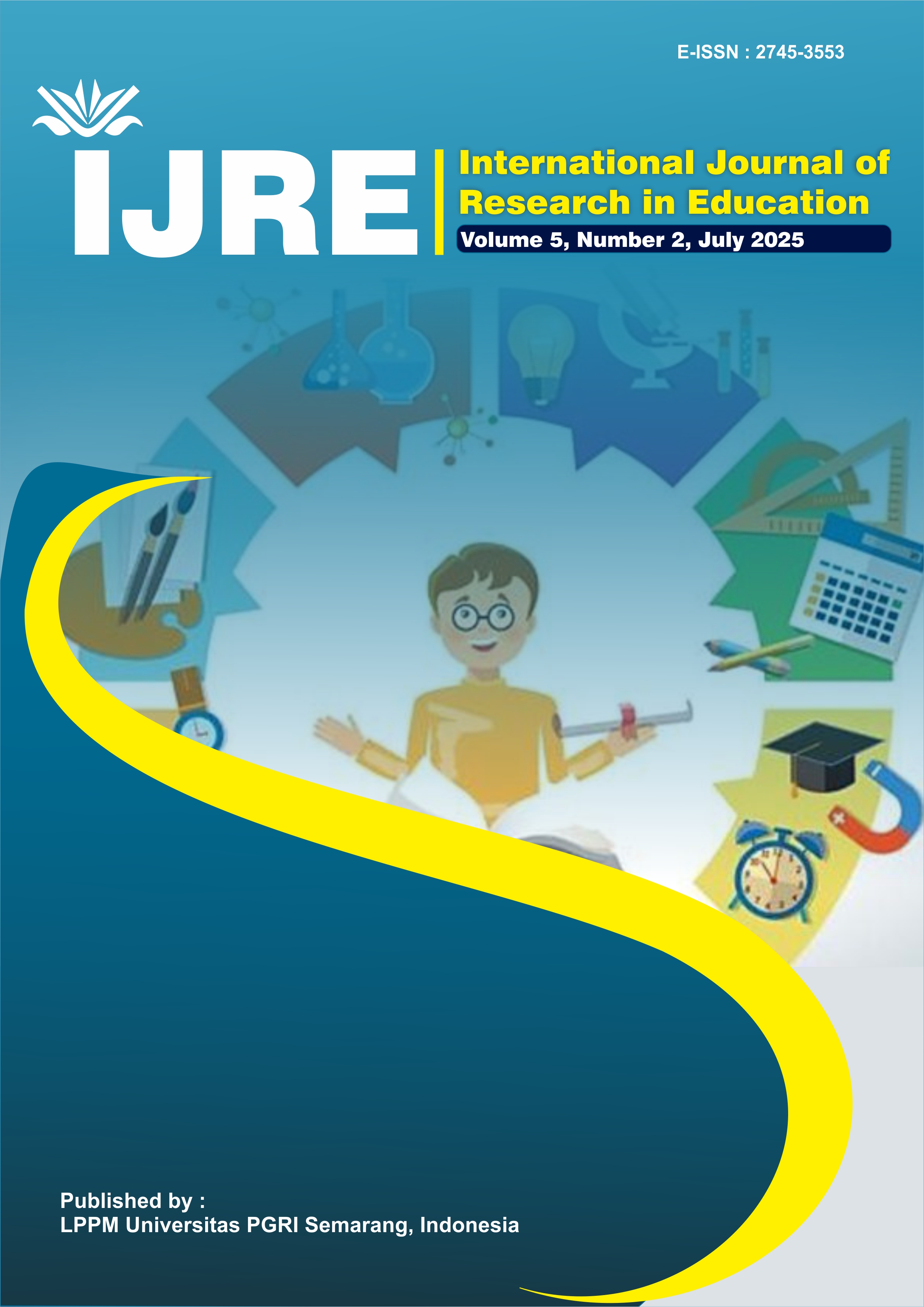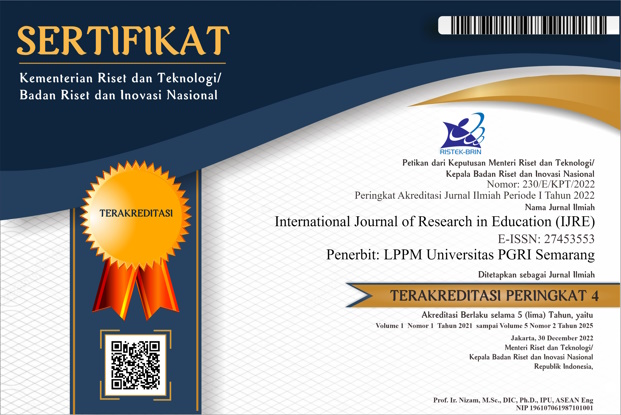Students’ Barriers in Writing Thesis Proposal: Psychological Factors
DOI:
https://doi.org/10.26877/0n13rn25Keywords:
Affective Factors, Thesis Proposal Writing, Psychological Barriers, Academic Writing, Qualitative Research, WritingAbstract
For undergraduate students, writing a thesis is an essential academic requirement since it offers a chance to combine theoretical knowledge with useful research techniques. However, the process of writing a thesis can be extremely difficult in developing nations like Indonesia, mostly because of psychological hurdles that have not received enough attention in local studies. The purpose of this study is to look at the psychological obstacles that Universitas Muhammadiyah Kendari students enrolled in the English Language Education Program encounter when drafting their thesis proposals. Data were gathered from four final-year students using semi-structured interviews and open-ended questionnaires using a descriptive qualitative methodology. Three primary themes emerged from the thematic analysis: challenges in starting and maintaining a writing career, effects on one's physical and mental well-being while writing, and methods and social support employed to get beyond these hurdles. It was discovered that psychological barriers including procrastination, anxiety, insecurity, and fear of failing have a detrimental impact on students' wellbeing and considerably slow down the writing process. Support from peers, family, and supervisors as well as individual coping mechanisms were essential in assisting students in handling the demands of their studies. Higher education institutions should offer holistic guidance approaches and a supportive learning environment to improve students' mental health and thesis completion, according to the study's findings, which also show that emotional and psychological preparedness is just as important for academic success as intellectual proficiency.
References
Badley, G. (2009). Academic writing as shaping and re-shaping. Teaching in Higher Education, 14(2), 209–219. https://doi.org/https://doi.org/10.1080/13562510802602691
Bazrafkan, L., Shokrpour, N., Yousefi, A., & Yamani, N. (2016). Professional stress experienced by Iranian medical students. Strides in Development of Medical Education, 16(1), 47–55. https://doi.org/: https://doi.org/10.5812/sdme.57524
Braun, V., & Clarke, V. (2006). Using thematic analysis in psychology. Qualitative Research in Psychology, 3(2), 77–101. https://doi.org/https://doi.org/10.1191/1478088706qp063oa
Brown, H. D. (2000). Principles of Language Learning and Teaching (4th ed.). Longman. https://archive.org/details/principlesoflang0000brow
Creswell, J. W., & Poth, C. N. (2018). Qualitative Inquiry and Research Design: Choosing Among Five Approaches (4th ed.). SAGE Publications. https://us.sagepub.com/en-us/nam/qualitative-inquiry-and-research-design/book246896
Deci, E. L., & Ryan, R. M. (1985). Intrinsic Motivation and Self-Determination in Human Behavior. Springer. https://doi.org/https://doi.org/10.1007/978-1-4899-2271-7
Denzin, N. K., & Lincoln, Y. S. (2011). The SAGE Handbook of Qualitative Research (4th ed.). SAGE Publications.
Felix, R., & Smith, L. (2019). Developing student researchers: A framework for reflective practice. Higher Education Research & Development, 38(3), 541–554. https://doi.org/https://doi.org/10.1080/07294360.2018.1545747
Gentles, S. J., Charles, C., Ploeg, J., & McKibbon, K. A. (2015). Sampling in qualitative research: Insights from an overview of the methods literature. The Qualitative Report, 20(11), 1772–1789. https://doi.org/https://doi.org/10.46743/2160-3715/2015.2373
Gill, P., Stewart, K., Treasure, E., & Chadwick, B. (2008). Methods of data collection in qualitative research: Interviews and focus groups. British Dental Journal, 204(6), 291–295. https://doi.org/https://doi.org/10.1038/bdj.2008.192
Healey, M., Jenkins, A., & Lea, J. (2013). Developing research-based curricula in college-based higher education. Higher Education Academy. https://www.advance-he.ac.uk/knowledge-hub/developing-research-based-curricula-college-based-higher-education
Howell, A. (2021). Growth mindset and academic resilience. Psychology in the Schools, 58(9), 1682–1693. https://doi.org/: https://doi.org/10.1002/pits.22547
Jamshed, S. (2014). Qualitative research method-interviewing and observation. Journal of Basic and Clinical Pharmacy, 5(4), 87–88. https://doi.org/https://doi.org/10.4103/0976-0105.141942
Jones, M., & Green, B. (2019). The research higher degree and the challenges of supervision. Studies in Higher Education, 34(3), 371–385. https://doi.org/https://doi.org/10.1080/03075070802597124
Jönsson, A., Beach, D., & Erlandson, P. (2021). Anxiety and agency in doctoral education: Policy and practice. Higher Education Research & Development, 40(6), 1212–1224. https://doi.org/https://doi.org/10.1080/07294360.2020.1815667
Khan, A., & Shaw, J. (2021). The student-supervisor relationship in higher education. International Journal of Doctoral Studies, 16, 45–61. https://doi.org/https://doi.org/10.28945/4687
Kumar, R., & Singh, N. (2018). Exploring academic anxiety and stress in undergraduate students: A Southeast Asian perspective. Asian Journal of Education and Social Studies, 7(3), 1–10. https://doi.org/https://doi.org/10.9734/ajess/2018/43798
Kvale, S., & Brinkmann, S. (2009). InterViews: Learning the Craft of Qualitative Research Interviewing (2nd ed.). SAGE Publications. https://us.sagepub.com/en-us/nam/interviews/book233508
Lee, Y., & Kim, H. (2018). Academic writing and mental health: A study on EFL graduate students. TESOL Journal, 9(3), e00423. https://doi.org/https://doi.org/10.1002/tesj.423
Lincoln, Y. S., & Guba, E. G. (1985). Naturalistic Inquiry. SAGE Publications. https://us.sagepub.com/en-us/nam/naturalistic-inquiry/book842
Martinez, E., & Silverstein, M. (2017). The impact of sociocultural factors on thesis writing. Journal of Asian Education, 18(2), 134–148.
Mitchell, K., Snyder, C., & Abernathy, T. (2019). Feedback anxiety: Exploring the tension. Journal of Academic Support, 27(4), 211–223.
Muenchen, R. A., & Choi, K. (2017). Psychological characteristics of successful academic writers. Educational Psychology Review, 29(1), 25–43. https://doi.org/https://doi.org/10.1007/s10648-015-9350-4
Nowell, L. S., Norris, J. M., White, D. E., & Moules, N. J. (2017). Thematic analysis: Striving to meet the trustworthiness criteria. International Journal of Qualitative Methods, 16(1), 1–13. https://doi.org/https://doi.org/10.1177/1609406917733847
Palinkas, L. A., Horwitz, S. M., Green, C. A., Wisdom, J. P., Duan, N., & Hoagwood, K. (2015). Purposeful sampling for qualitative data collection and analysis in mixed method implementation research. Administration and Policy in Mental Health and Mental Health Services Research, 42(533–544). https://doi.org/https://doi.org/10.1007/s10488-013-0528-y
Papi, M., Bondarenko, A. V., Nejad, A. M., & Feng, L. (2021). Motivational mindsets and academic writing performance. System, 96, 102408. https://doi.org/https://doi.org/10.1016/j.system.2020.102408
Patton, M. Q. (2002). Qualitative Research & Evaluation Methods (3rd ed.). SAGE Publications. https://us.sagepub.com/en-us/nam/qualitative-research-evaluation-methods/book232962
Robinson, D., & Harris, A. (2021). The thesis advisor relationship: Success and support. Educational Review, 73(5), 605–621. https://doi.org/https://doi.org/10.1080/00131911.2020.1766203
Sabti, A. A. A., Rashid, R. A., & Tadros, K. (2019). Writing anxiety and achievement motivation among EFL university students in Iraq. International Journal of Education & Literacy Studies, 7(1), 50–60. https://doi.org/https://doi.org/10.7575/aiac.ijels.v.7n.1p.50
Schwandt, T. A. (2015). The SAGE Dictionary of Qualitative Inquiry (4th ed.). SAGE Publications. https://us.sagepub.com/en-us/nam/the-sage-dictionary-of-qualitative-inquiry/book243616
Stewart, S., & Hunter, C. (2018). Academic writing struggles: A cross-cultural perspective. International Journal of Educational Research, 87, 25–34. https://doi.org/https://doi.org/10.1016/j.ijer.2017.10.007
Taffs, K., & Holt, J. (2019). Supporting anxious student writers in higher education. Journal of Writing Research, 11(2), 393–414. https://doi.org/https://doi.org/10.17239/jowr-2019.11.02.06
Taylor, J., & Davis, R. (2020). Understanding student success through personality and mindset. Educational Psychology, 40(7), 783–798. https://doi.org/https://doi.org/10.1080/01443410.2019.1685591
Tsao, C.-W., Wang, Y.-S., & Lin, H.-C. (2017). The impact of anxiety and feedback perception on writing performance. Asian EFL Journal, 19(3), 132–151.
Tsou, W., & Kao, Y. (2024). Emotional challenges of thesis writing in EMI contexts. International Journal of Educational Psychology, 13(1), 112–130. https://doi.org/https://doi.org/10.17583/ijep.2024.12345
Vaismoradi, M., Turunen, H., & Bondas, T. (2013). Content analysis and thematic analysis: Implications for conducting a qualitative descriptive study. Nursing & Health Sciences, 15(3), 398–405. https://doi.org/https://doi.org/10.1111/nhs.12048
Zhang, Y., & Liu, C. (2020). Barriers to academic writing in Chinese undergraduates. Journal of Language Teaching and Research, 11(2), 289–297.



